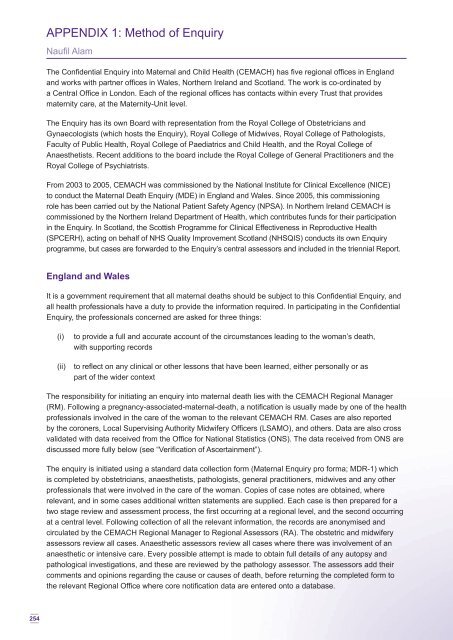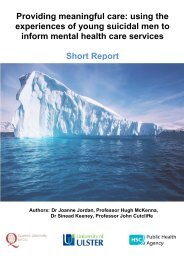Saving Mothers' Lives: - Public Health Agency for Northern Ireland
Saving Mothers' Lives: - Public Health Agency for Northern Ireland
Saving Mothers' Lives: - Public Health Agency for Northern Ireland
Create successful ePaper yourself
Turn your PDF publications into a flip-book with our unique Google optimized e-Paper software.
254<br />
APPENDIX 1: Method of Enquiry<br />
Naufi l Alam<br />
The Confi dential Enquiry into Maternal and Child <strong>Health</strong> (CEMACH) has fi ve regional offi ces in England<br />
and works with partner offi ces in Wales, <strong>Northern</strong> <strong>Ireland</strong> and Scotland. The work is co-ordinated by<br />
a Central Offi ce in London. Each of the regional offi ces has contacts within every Trust that provides<br />
maternity care, at the Maternity-Unit level.<br />
The Enquiry has its own Board with representation from the Royal College of Obstetricians and<br />
Gynaecologists (which hosts the Enquiry), Royal College of Midwives, Royal College of Pathologists,<br />
Faculty of <strong>Public</strong> <strong>Health</strong>, Royal College of Paediatrics and Child <strong>Health</strong>, and the Royal College of<br />
Anaesthetists. Recent additions to the board include the Royal College of General Practitioners and the<br />
Royal College of Psychiatrists.<br />
From 2003 to 2005, CEMACH was commissioned by the National Institute <strong>for</strong> Clinical Excellence (NICE)<br />
to conduct the Maternal Death Enquiry (MDE) in England and Wales. Since 2005, this commissioning<br />
role has been carried out by the National Patient Safety <strong>Agency</strong> (NPSA). In <strong>Northern</strong> <strong>Ireland</strong> CEMACH is<br />
commissioned by the <strong>Northern</strong> <strong>Ireland</strong> Department of <strong>Health</strong>, which contributes funds <strong>for</strong> their participation<br />
in the Enquiry. In Scotland, the Scottish Programme <strong>for</strong> Clinical Effectiveness in Reproductive <strong>Health</strong><br />
(SPCERH), acting on behalf of NHS Quality Improvement Scotland (NHSQIS) conducts its own Enquiry<br />
programme, but cases are <strong>for</strong>warded to the Enquiry’s central assessors and included in the triennial Report.<br />
England and Wales<br />
It is a government requirement that all maternal deaths should be subject to this Confi dential Enquiry, and<br />
all health professionals have a duty to provide the in<strong>for</strong>mation required. In participating in the Confi dential<br />
Enquiry, the professionals concerned are asked <strong>for</strong> three things:<br />
(i) to provide a full and accurate account of the circumstances leading to the woman’s death,<br />
with supporting records<br />
(ii) to refl ect on any clinical or other lessons that have been learned, either personally or as<br />
part of the wider context<br />
The responsibility <strong>for</strong> initiating an enquiry into maternal death lies with the CEMACH Regional Manager<br />
(RM). Following a pregnancy-associated-maternal-death, a notifi cation is usually made by one of the health<br />
professionals involved in the care of the woman to the relevant CEMACH RM. Cases are also reported<br />
by the coroners, Local Supervising Authority Midwifery Offi cers (LSAMO), and others. Data are also cross<br />
validated with data received from the Offi ce <strong>for</strong> National Statistics (ONS). The data received from ONS are<br />
discussed more fully below (see “Verifi cation of Ascertainment”).<br />
The enquiry is initiated using a standard data collection <strong>for</strong>m (Maternal Enquiry pro <strong>for</strong>ma; MDR-1) which<br />
is completed by obstetricians, anaesthetists, pathologists, general practitioners, midwives and any other<br />
professionals that were involved in the care of the woman. Copies of case notes are obtained, where<br />
relevant, and in some cases additional written statements are supplied. Each case is then prepared <strong>for</strong> a<br />
two stage review and assessment process, the fi rst occurring at a regional level, and the second occurring<br />
at a central level. Following collection of all the relevant in<strong>for</strong>mation, the records are anonymised and<br />
circulated by the CEMACH Regional Manager to Regional Assessors (RA). The obstetric and midwifery<br />
assessors review all cases. Anaesthetic assessors review all cases where there was involvement of an<br />
anaesthetic or intensive care. Every possible attempt is made to obtain full details of any autopsy and<br />
pathological investigations, and these are reviewed by the pathology assessor. The assessors add their<br />
comments and opinions regarding the cause or causes of death, be<strong>for</strong>e returning the completed <strong>for</strong>m to<br />
the relevant Regional Offi ce where core notifi cation data are entered onto a database.



